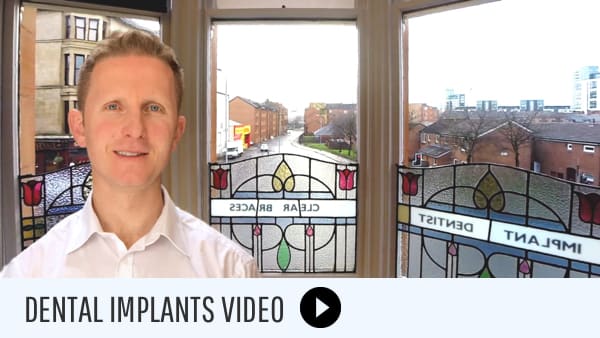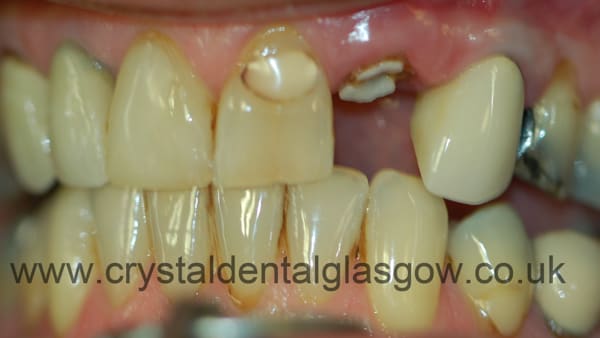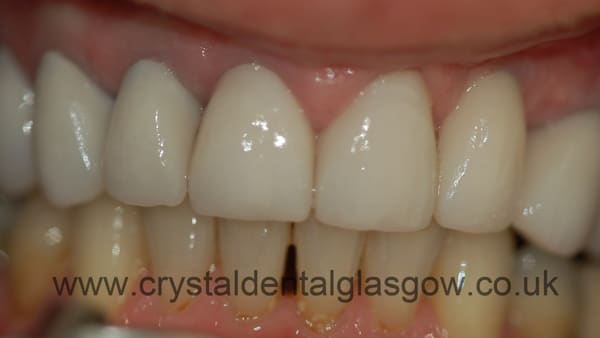Do you have missing or damaged teeth and want a long-term solution which feels and looks great? Dental implants could be the answer
- They keep your natural smile and face shape
- They are stable and long-lasting
- You avoid the need for dentures
- You worry less about what you eat
- They protect healthy teeth
- They are the next best thing to getting your own teeth back
A Patient Speaks About His Implant
I was given an NHS denture by another dentist which was uncomfortable, unsightly and wasn’t great for my speech. Somebody I know put me onto Dr Murphy and that was a bit of a lifesaver to be honest.
He was able to help me out really quickly, first with a high-quality denture to replace the old one and then with my dental implant. The pain side has been very limited, in fact just a few pin pricks from the injections and that was it. All the dental staff have been really helpful throughout my treatment.
Jamie, Implant Patient

ANATOMY OF AN IMPLANT
An implant is a small metal screw made of titanium that is placed surgically in the jaw and acts as an artificial tooth root to replace the natural one that is missing.
It has internal and external threads: externally it engages and fixes to bone; internally it allows gold posts, precision attachments and subsequently crown and bridgework and dentures to be attached.
Titanium has the ability for bone to attach to it and the implant becomes solidly held within the jaw, a process termed osseo-integration.
Implants are placed with a local anaesthetic, and following this you should expect a degree of discomfort and swelling for a few days but you will be able to continue normally almost immediately.
You should be in no pain. We will take some radiographs and possibly a CT scan to allow us to select the appropriate length and positions of the implants.
Dental implants generally have success rates in excess of over 5 years according to recent clinical research. Dr Murphy has placed several hundred implants over many years and his findings echo those success rates.
In the case of a failing implant it is usually possible to replace it after a few months and this will normally be done at no additional cost to you. It is extremely rare for two successive implants to fail and if failure occurs it is usually in the first or second year. Dr Murphy will wait until he is confident of implant integration before restoring it in order to secure the best prognosis for your new teeth.
Dr Murphy uses BH laser-lok implants allowing maximum implant integration with bone. These come in several lengths and widths, allowing him to select the appropriate size depending on the available ridge of bone.
A WEALTH OF IMPLANT EXPERIENCE
Dr Murphy leads the team at Crystal Dental Care. He is a very experienced implant dentist having successfully completed an implantology course in Edinburgh in 2005-6 followed by further training at home and abroad .
Dr Murphy is a member of the International Team for Implantology as well as the Association of Dental Implantology.
You can find several examples of implant cases in our case studies page as well as before-and-after photographs in the dental gallery.
HOW MUCH DO DENTAL IMPLANTS COST IN GLASGOW?
We have a transparent and straight-forward approach to implant pricing here in our Glasgow practice. We like to be upfront about our prices in order to protect our patients from nasty surprises. Dental implants costs in Scotland vary widely but we believe we strike the right balance between delivering a great service using the latest technologies and fair implant pricing.
The most common restoration is the single implant and single crown combination which costs £2500. This is less than most dentists in Glasgow charge for dental implants.
Don’t forget we can help you manage implant fees with dental finance plans to spread the cost. This is worth considering and a variety of plans can also help you budget for your future dental costs.
If you need to know more about the costs of dental implants do not hesitate to contact the staff here at Crystal Dental Glasgow.
Examples of Implant Prices
Example Restoration 1
Six missing teeth.
Three implants placed: £3000
Six teeth on three zirconium posts and a pressed porcelain ceramic bridge: £5100.
Total costs = £8100.
Example Restoration 2
All lower teeth missing.
Two implants placed : £2000.
Two gold locators and removable over-denture with precision attachments:£1500.
Total Costs=£3500
Example Restoration 3
All lower teeth missing.
‘All on four’ technique. Four implants:£4000.
Fixed acrylic bridge with integrated titanium bar and twelve teeth: £5750.
Total Costs= £9750
Local grafting (mild bone insufficiency) costs £250 per site. Block grafting (severe bone loss): by arrangement on referral. Scans cost: £200-300 on referral.
All the above prices are examples for guidance only and were correct at the time the work was done. Please check with reception for up to date implant prices.
Dental Implants Journey - Step by Step
Here is a great example of what can be done with dental implants to change a broken smile.
This patient came to our Glasgow clinic with a fractured root on an upper incisor along with multiple other dental problems.
In this case study we follow the patient step by step through their implant treatment.
AFTER YOUR IMPLANT SURGERY
Implants are considered to be one of the most successful types of dental treatment and typically, 95% of patients have no pain, swelling or infection around implants after 5 years.
There is no guarantee, however, that they will last forever and it is principally the care of gums around your implants, which dictates the long-term prognosis.
We offer non-smokers a guarantee that should an implant fail within one year, it will be replaced free of charge.
Peri-implantitis is a condition which can affect the gums around implants causing bone loss. When early diagnosis occurs, peri-implantitis is treatable: it must occur quickly to arrest bone loss as soon as possible.
Fractures in porcelain crown/bridgework or damage to acrylic prosthetic teeth may occur if you use your new ‘teeth’ to bite excessively hard on certain non-food materials. These include tomato sauce/condiment sachets, sellotape, sweetie wrappers, fingernails and similar materials which require a simultaneous biting and pulling action.
The following advice concerns all patients who have received dental implant treatment:
- Brush around teeth and implants twice daily. Brush the inside as much as the outside. Time brushing to last 2.5-3 minutes.
- Clean in between implants twice daily using floss/tepe interdental brushes once daily.
- Visit a dental hygienist every 3-6 months to ensure that implants are scaled/polished with specialist instruments as advised. This also applies to patients without any remaining teeth.
- Return to Dr Murphy for annual checkups and xrays of implants. This is to ensure that bone levels are closely monitored and the areas around your implant are free of significant inflammation, thereby maximising the longevity of dental implant treatments. (Examination fee £19; xrays £11).
- If you smoke, please stop. It is never too late to have a positive effect on remaining teeth and implants going forward. Failing cessation, please cut down on all forms of nicotine with a view to stopping in the long term.
Frequently Asked Questions
Need help? Be sure to contact us for answers to your questions!
Does it hurt to get an implant?
Many of our patients report little or no pain during an implant procedure. In fact they frequently say the only uncomfortable moment comes from the pin prick of injections to numb their mouth.
Can I get sedation?
Yes if you are particularly nervous, discuss this with Dr Murphy our implantologist. He can arrange for you to receive dental sedation if you are anxious. Occasionally patients will also receive sedation if the procedure is particularly complex.
How long does it take to get an implant?
This varies by individual but a rough timetable will be discussed at your initial consultation. It’s important to remember implant treatment is quite invasive therefore it is important to make sure the area is ready before we proceed to each stage of your tooth replacement.
Can I replace a NHS denture with an implant?
Yes, it’s not unusual for patients to refer themselves once they find the NHS denture they have been given is uncomfortable, badly fitting or annoying to keep clean. They will then discuss their options with Dr Murphy and agree a treatment plan going forward.
How long will my implants last?
As long as you follow your dentist’s instructions as well as attend your regular hygiene appointments your dental implant is likely to last a very long time. That is one of the attractions of modern implant technology. The success rate of our dental implants make them an excellent option for tooth replacement.
What about aftercare?
This starts with your free hygiene appointment following the implant treatment when our hygienist will give you all the advice you need to keep your implant clean and your mouth in general in a healthy condition.
Will dental implants feel like my own teeth?
Yes, implants will feel like your own teeth. Since a tooth implant integrates into the structure of your bone, it prevents the bone loss and gum recession that often accompanies bridge work and dentures. There is a very good chance that few of your friends will even know that you have a replacement tooth.
Will they help save my other teeth?
Dental implants do not sacrifice the quality of your adjacent teeth like a bridge does because neighbouring teeth are not altered to support the implant. More of your own teeth are left untouched, a significant long-term benefit to your oral health!
Am I likely to be a suitable patient for dental implants?
The ideal candidate for a dental implant is in good general oral health with enough bone in your jaw to support the implant and best of all will be free of periodontal disease. The experienced team at Crystal Dental Care will be able to assess your individual case and advise accordingly.
What about smoking and implants?
We often discuss the effect of smoking on teeth generally but more specifically nowadays on an implant healing. Whilst some report that there is a small increased risk of an implant(s) failing to integrate, the major effect of smoking is on the long-term health of the gums around the implants. We certainly see an increased incidence of gum disease around implants in smokers and this mirrors the effect of nicotine on the gums around natural teeth. This is something of which you must be aware. The best advice is always to stop smoking.
Dr Brendan Murphy, Implant Dentist
I graduated from the University of Glasgow in 1992 and worked as an associate in Glasgow for four years, before starting a partnership with a trusted university friend.
We purchased six practices, all within the Glasgow area and latterly assisted by an additional partner. Experience acquired over the last nine years involving implant dentistry was a driving force in the decision to go it alone and I now run two practices in Glasgow's West End.
We accept many referrals from colleagues which mostly include professional friends, associates and former associates, although word of mouth seems to have augmented numbers over recent years.
Biohorizons Laserlok implants have undoubtedly changed my implant practises: I am less likely to prescribe more than four implants in a full arch denture case involving locators or milled bar with attachments.
Like many treatment providers, we have become obsessed with audit numbers. Implant dentistry has been the beneficiary of this trend, however, as we have seen early implant failures almost completely disappear.
Most dentists refer cases for implant borne crown and bridgework to us, although more of us are now considering the various denture alternatives involving a multitude of abutment types.
Cases may be taken from start to finish or returned to the referring dentist for prosthetic stages, depending on the preference of the referrer.
It is a fundamental requirement that they go back to their dentist for regular recall examinations and routine care, particularly in light of heightening concerns regarding early diagnosis of peri-implantitis.
Implants and Bone Loss - Making Implants Possible
Older people and patients who have had a missing tooth for several years often lack sufficient bone for an immediate implant. However we have ways of improving their bone situation to the point where we can proceed with implant treatment.
Sinus bone augmentation
Shortage of bone in the upper jaw can occur as a result of bone loss in the sinus area, both internally and also due to the bone loss around the tooth roots following tooth loss. This shortage of bone height below the maxillary sinus may not allow the placement of implants of suitable length.
We sometimes therefore need to carry out sinus bone augmentation in order to facilitate the placement of implants of a suitable size.
Sinus augmentations are a routine procedure and common adjunct to implant therapy in this part of the mouth and are very predictable and carry a very high success rate in my experience.
In fact, research shows that implants placed into sinus grafts have a higher success rate than those in regular maxillary bone. Once again, we are talking of success rates in excess of 95%.
This procedure involves raising the sinus lining and placing a bone material into the space we create. This is usually left for several months during which time the graft usually consolidates and becomes suitable bone in which to place implants of a sufficient length.
If there is 4-8mm of bone at the start of treatment we will often place implants and augment the sinus simultaneously. Sinus augmentations are generally carried out with local anaesthetic as with normal dental treatment.
Local and Block Grafting
Local grafting involves the use of materials to cover up small defects where bone has been damaged by infection, root fractures and minor trauma before the tooth was extracted. It can also cover exposed threads on implants when the ridge of bone is thin near its surface.
A charge is levied in this instance to cover material costs. Bone may be carefully removed from other areas of the mouth to supplement deficient bone where implants are required. This is called block grafting.
Graft Materials
The material we often use is called BioOss, a de-proteinated bovine bone mineral. You can be assured that it is an absolutely safe material (no organic components remain after laborarory preparation) and it has been subject to a huge amount of research all over the world, with an absence of negative feedback.
This is unusual in the dental field. BioOss has been proven to be the best material in sinus grafts and the most recently published figures confirm that success rates are as good as for implants placed without sinus involvement. A porcine membrane is often used to protect local or sinus grafts.
Once integrated and functioning, the overall research shows that you have in excess of a 90% chance of any implant still performing fine after 25 years.
Therefore implants are a long term and predictable treatment option, probably a lifetime.
There is around a 20% risk of swelling +/- bruising following implant surgery and a slight risk (of 1%) that an adjacent tooth can be damaged leading to requirement of root canal treatment (this compares to a risk of 20% during crown or bridge preparation).
When working in the lower molar area there is a chance of damage to adjacent nerves. This can cause temporary numbness or pain and is very rarely permanent. A scan is advisable when bone levels are limited in this and other areas.
There is a small risk of graft rejection which may necessitate the use of pink porcelain (with a small additional technician’s fee if required).
Pink porcelain can disguise spaces and allow for normal tooth proportion in cases where gum tissue has been lost.
Further Reading
You can read more about dental implants on the Dental Health Foundation website. There is also great information on dental implants on the Association of Dental Implantology website.



